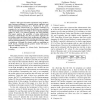Free Online Productivity Tools
i2Speak
i2Symbol
i2OCR
iTex2Img
iWeb2Print
iWeb2Shot
i2Type
iPdf2Split
iPdf2Merge
i2Bopomofo
i2Arabic
i2Style
i2Image
i2PDF
iLatex2Rtf
Sci2ools
115
click to vote
CIG
2006
IEEE
2006
IEEE
Monte-Carlo Go Reinforcement Learning Experiments
Abstract— This paper describes experiments using reinforcement learning techniques to compute pattern urgencies used during simulations performed in a Monte-Carlo Go architecture. Currently, Monte-Carlo is a popular technique for computer Go. In a previous study, Monte-Carlo was associated with domain-dependent knowledge in the Go-playing program Indigo. In 2003, a 3x3 pattern database was built manually. This paper explores the possibility of using reinforcement learning to automatically tune the 3x3 pattern urgencies. On 9x9 boards, within the Monte-Carlo architecture of Indigo, the result obtained by our automatic learning experiments is better than the manual method by a 3-point margin on average, which is satisfactory. Although the current results are promising on 19x19 boards, obtaining strictly positive results with such a large size remains to be done.
Related Content
| Added | 10 Jun 2010 |
| Updated | 10 Jun 2010 |
| Type | Conference |
| Year | 2006 |
| Where | CIG |
| Authors | Bruno Bouzy, Guillaume Chaslot |
Comments (0)

